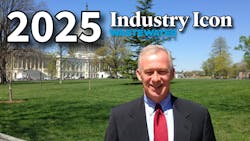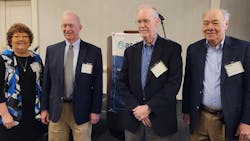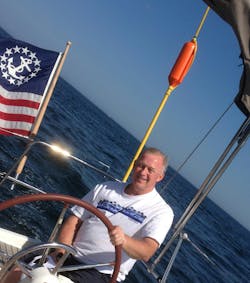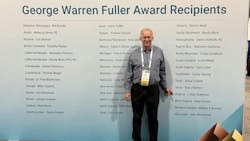2025 WWD Industry Icon: From Tulsa to water industry leader
If you were to open a map and pin Tulsa, Oklahoma, on it, you’d find that it sits central in the United States. For a young boy, whose father worked for American Airlines, this provided ample travel opportunity. One central location to call home, and a vast network of flight options. From Tulsa, you can head in almost any direction. Traveling to far and foreign locations broadens perspective, and it can leave a lasting impact on a young mind’s imagination. Witnessing the world through a new lens can change a man. When these experiences compound and culminate the transformation becomes astronomical.
Fast forward a few decades, and the young man who once called Tulsa home, who travelled from a young age, who gained a unique perspective, is now changing the lives of other people through water.
His name carries weight in the water industry, and his work has changed lives across the United States, including those in his hometown of Tulsa.
Alan Roberson has accumulated a wealth of experience that bridges engineering, policy and leadership. His career offers insights into the technical side of the water industry but also into the importance of relationships, adaptability and resilience.
The now-retired immediate-past executive director of the Association of State Drinking Water Administrators (ASDWA) emphasizes that one of the most important lessons he has learned is the value of people and networks.
Ask questions and listen carefully
After earning a civil engineering degree from Georgia Tech, Roberson spent a decade in consulting, working on land development projects. Early in his career, as an engineer stepping into consulting, he quickly realized that classroom knowledge only provided the foundation. To be effective, he had to ask questions, listen carefully and learn from seasoned colleagues.
“You can be efficient in your learning by asking a lot of questions and then listening to what they say and absorbing it,” Roberson said. “Relationships are equally important.”
In 1990, as Roberson was working on advancing his career, the savings and loan crisis struck. He was laid off. But what seemed like a setback became an opportunity. Despite his downtime, Roberson was still working hard – searching for a new job.
He stumbled upon an ad in the Washington Post for a position with the American Water Works Association (AWWA).
“A door closed and another one opened,” Roberson said.
Advancing policy and changing lives
Little did Roberson know at the time when he was hired at AWWA, but the next 25 years of his life would be spent bettering lives. He played a central role in regulatory and legislative developments, most notably during the lead-up to the 1996 amendments to the Safe Drinking Water Act.
He was deeply involved as the Environmental Protection Agency (EPA) issued a series of major drinking water regulations through the late 1990s and the early 2000s.
“The man”
Mike McGuire had been advancing his career in California at the Metropolitan Water District for Southern California where he was the director of water quality, eventually becoming the general manager before he left to open his own consulting practice in 1992. This was around the same time the first negotiations began for the Disinfectants and Disinfection Byproducts Rules and the Surface Water Treatment Rule. McGuire found himself travelling back-and-forth from LA to Washington D.C. where he was interacting with Alan frequently during the early days of negotiations.
McGuire credits Alan for creating a functional and accessible database for the information collection effort, preventing the creation of a difficult-to-use system.
“He is not afraid to express his point of view and do what’s right – even in the face of pressure from a lot of different people in Washington,” he said.
McGuire refers to Alan as “the man” when it comes to regulation and legislation. During a negotiation with the EPA in Cincinnati, McGuire stated that Alan stood his ground and advocated for what was right. He described it as the “perfect negotiation.”
Over the years the two have developed a close friendship. They keep in touch regularly and offer support to one another during troubled times.
“Alan is a true friend,” McGuire said. “There’s not many people like him.”
Feeling at ease
In 2007, Alan interviewed Cynthia Lane for a position at the AWWA. She said she felt underqualified at the time, but Alan made her feel at ease, and his support allowed her to begin her career.
“He was okay with taking risks on people – seeing the potential in them and helping cultivate their careers,” she said.
Lane described Alan as an incredibly supportive boss. In her words, he’s very trusting of his staff as well as a great person to learn from.
“He’s like the Safe Drinking Water Act guru,” she said. “I know so many people that call him for questions about anything SDWA. He’s just a great resource for many of us out here in the sector.”
Missed call
Wendi Wilkes first learned of Alan while working at the AWWA in 2016. Within the first few weeks of her starting at the association, she began receiving phone calls for dinner reservations. After receiving a fourth phone call for a dinner reservation for Alan Roberson she decided to act and ask a colleague if they knew who this guy was.
Wendi obtained Alan’s email and reached out to say she kept receiving restaurant reservations in his name. As it turns out she occupied Alan’s previous office during the area’s restaurant week. Alan joked about her being his executive assistant for taking his reservation calls and even insisted on a Christmas gift for filling the unofficial assistant position. Alan then welcomed her to the D.C. area and offered help on any background or advice she would need.
Wendi quickly took him up on that offer.
“He was like a mentor and a friend pretty much immediately,” she said.
A few years later Wendi ended up working for Alan at ASDWA before being appointed by President Biden to EPA to help with BIL funding programs. She reflected on her interactions with Alan, noting that despite a large gap in expertise and experience, he was always willing to pick up the phone.
Continuing the work
Later, Roberson moved into the top executive role at the ASDWA, continuing his policy-focused work. In addition, he has served for more than 15 years on the Fairfax Water board, giving him a direct governance role at the utility level.
Dr. Joseph Jacangelo, who recently retired as director of research from Stantec, reflected on his long-standing professional and personal relationship with Alan.
“He is the consummate professional and is always very proactive in whatever he undertakes,” he said. “And as a friend, he was just a good friend. We’d spend time together and we just had so much in common. It’s just been a wonderful relationship that I’ve had with him over the years, and I really treasure that friendship that we had.”
The two interacted frequently while at the AWWA, where Dr. Jacangelo moved up through the organization to become president. Outside of their professional lives, they often played tennis together until Alan had knee surgery.
“I always tell him, he didn’t have to go to that extent just to avoid playing me,” Dr. Jacangelo joked.
While attending conferences, the two joked around about only seeing each other at events, despite living only 30 miles apart in Virginia.
Dr. Jacangelo and Roberson both taught at John Hopkins University’s School of Public Health and have been toying with the idea of teaching a course together that would focus on the intersection of policy, engineering and regulations.
Lessons from COVID
The COVID-19 pandemic was another shift in momentum that Roberson had to adapt to. Much throughout his career, he built and maintained relationships face-to-face, but the pandemic threw a wrench in the gear-set that he was used to working with. He pointed out that existing relationships were relatively easy to maintain, but forging new ones had been far more challenging.
“If you had a relationship with someone, it’s easy to continue post-COVID,” he said. “But if you’re trying to get to know someone, it’s more difficult.”
Roberson stressed the need for face-to-face meetings to usher in new relationships. However, his adaptability to the pandemic and the resulting shift to online meetings and long-distance talks further cements his open-mindedness.
A common thread through these experiences has been adaptability. Roberson entered the workforce in an era of hand-drawn engineering plans and has since witnessed shifts to CAD drafting, personal computers, email and now AI-assisted tools.
“It’s part of not being a curmudgeon,” he joked. “Things keep evolving, and I want to keep up.”
Roberson views newer technologies not as threats, but as tools to be explored, tested and eventually incorporated into daily practice.
Retirement and looking ahead
While reflecting on his career, Alan valued the balance that comes from life outside of work. He enjoys hiking with his wife in Virginia’s Shenandoah region, playing tennis after recovering from knee replacements and spending time with his three children.
He also looks forward to diving into more nonfiction reading in retirement, carrying forward the same openness to learning that has defined his career.
For Roberson, success has never been about being the smartest person in the room. Instead, it has been about listening, asking questions and working alongside others toward common goals. In an industry where collaboration is essential, that philosophy has served him – and the sector – exceptionally well.
About the Author
Alex Cossin
Associate Editor
Alex Cossin is lead reporter, staff writer and content strategist for Waterworld Magazine, Wastewater Digest, Stormwater Solutions and Water Technology. Cossin graduated from Kent State University in 2018 with a Bachelor of Science in Journalism. Cossin can be reached at [email protected].





